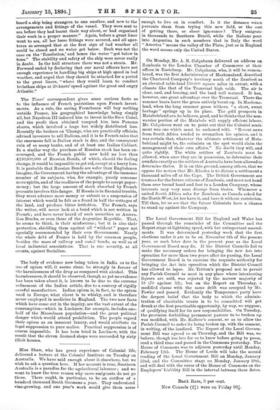On Monday, Mr. A. R. Colquhoun delivered an address on
Zambesia to the London Chamber of Commerce at their offices in Eastcheap. Mr. Colquhonn, who, it will be remem- bered, was the first Administrator of Mashonaland, described the Chartered Company's territory south of the Zambesi as an elevated table-land 150.000 square miles in extent, with a climate like that of the Transvaal high veldt. The air is clear, cool, and bracing, and the land well watered. It has, however, one great advantage over the Transvaal. There the summer heats leave the grass entirely burnt-up. In Mashona- land, when the long summer grass withers, "a short, sweet herbage" springs up in its place. The gold prospects in Matabeleland are, he believes, good, and he thinks that the non- warrior portion of the Matabele will supply efficient labour. Mr. Colquhoun went on to point out that the Colonial senti- ment was one which must be reckoned with. "Recent news from South Africa tended to strengthen his opinion, and it was certain that, whatever the ultimate settlement of Mata- beleland might be, the colonists on the spot would claim the management of their own affairs." No doubt they will, and quite rightly. The white settlers of Zambesia must be allowed, when once they are in possession, to determine their own fate exactly as the settlers of Australia have been allowed to determine theirs. It is on this ground, among others, that we oppose the notion that Mr. Rhodes is to dictate a settlement a thousand miles off at the Cape. The British Government are trustees for the future citizens of Zambesia, and must not hand them over bound hand and foot to a London Company, whose interests may very soon diverge from theirs. Whenever a united South Africa asks for Zambesia as Canada asked for the North-West, let her have it, and have it without restriction. Till then, let us see that the future Colonists have a chance to stand up against the Company.






































 Previous page
Previous page